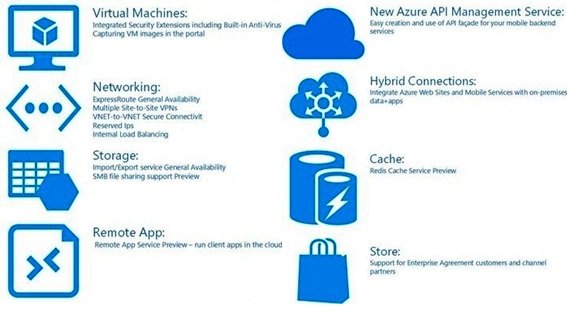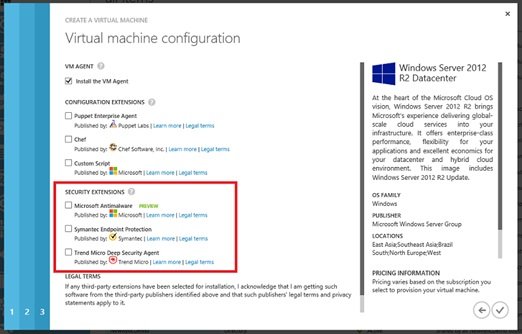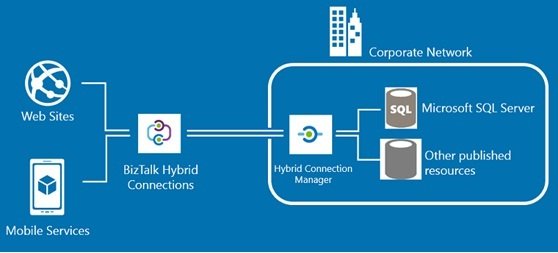Microsoft Azure, the cloud application platform from Microsoft, has received a massive amount of features. The list of features includes new security enhancements via the virtual machine, general availability of Azure ExpressRoute and Azure Import/Export Service.
Let’s see the major releases one by one.
Virtual Machine: Gets new security extensions
The new VM Agent which was introduced as an optional extension to Virtual Machines hosted on Azure is now equipped with three security extensions, namely,
- Microsoft Antimalware
- Symantec Endpoint Protection
- TrendMicro’s Deep Security Agent
Using the same users can now be assured of richer security protection to their Virtual Machines. To enable them using the Azure Management Portal simply check them when you create new a new Virtual Machine.
Azure ExpressRoute service is now available
One of the most important announcements to be made was the general availability of Azure ExpressRoute service. Generally, enterprises across the world have found it difficult to manage a fast and secure connection between cloud and their On Premise environments. Azure ExpressRoute enables dedicated, private, high-throughput network connectivity between Azure datacenters and on premise connections.
“We have previously announced several provider partnerships with ExpressRoute including with: AT&T, Equinix, Verizon, BT, and Level3. This week we are excited to announce new partnerships with TelecityGroup, SingTel and Zadara as well. You can use any of these providers to setup private fiber connectivity directly to Azure using ExpressRoute”, said Microsoft through a blog post.
Azure Import/Export Service gets a kick start
Another service to be made available was the Microsoft Azure Import/Export Service. Using this service, users will now be able to move large amounts of data into and out of your Microsoft Azure Storage accounts by transferring them on hard disks. You will just have ship your encrypted hard drives directly to Microsoft Azure data centers where your data will be transferred to or from your Microsoft Azure Blobs for your storage account. Therefore your network bandwidth will not get stretched no matter how large the data is.
Hybrid Connections features comes as free
Hybrid Connections is a new and easy way to build hybrid applications on Azure. Hybrid connections allow Azure websites and mobile services to easily access on-premises resources as if they were located on the same private network. Microsoft introduced a free tier of Azure BizTalk Services that enables everyone to use this new hybrid connection feature for free.
New Previews available
Apart from announcing general availability of many services, Microsoft also announced public reviews of new services.
Microsoft Azure File Service : Using the new standard SMB protocol, this new file service allows you to share files across Windows and Linux VMs, with all VMs having both read and write access to the files.
Azure RemoteApp : Using this service IT companies can enable employees to securely access their corporate applications from a variety of devices (including mobile devices like iPads and Phones).
New Azure API Management Service : The new Azure API Management Service allows you to create an easy to use API façade over a diverse set of mobile backend services (including Mobile Services, Web Sites, VMs, Cloud Services and on-premises systems), and enables you to deliver a friendly API developer portal to your customers.
New Azure Redis Cache Service : Enables customers the ability to use a secure, dedicated Redis cache, managed by Microsoft.
To know more about all features and enhancements click here to visit Scott Guthrie’s blog.



Leave a Reply